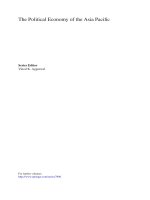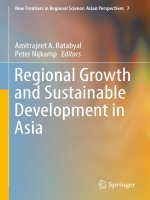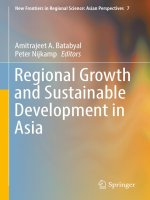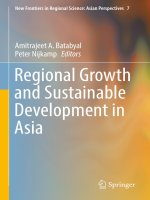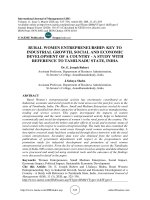Economic growth and economic development 18
Bạn đang xem bản rút gọn của tài liệu. Xem và tải ngay bản đầy đủ của tài liệu tại đây (43.96 KB, 1 trang )
Density of coutries
.0001
.00015
.0002
.00025
Introduction to Modern Economic Growth
.00005
1960
1980
0
2000
0
10000
20000
30000
gdp per capita
40000
50000
Figure 1.1. Estimates of the distribution of countries according to
PPP-adjusted GDP per capita in 1960, 1980 and 2000.
Part of the spreading out of the distribution in Figure 1.1 is because of the
increase in average incomes. It may therefore be more informative to look at the
logarithm of income per capita. It is more natural to look at the logarithm (log) of
variables, such as income per capita, that grow over time, especially when growth is
approximately proportional (e.g., at about 2% per year for US GDP per capita; see
Figure 1.8). Figure 1.2 shows a similar pattern, but now the spreading-out is more
limited. This reflects the fact that while the absolute gap between rich and poor
countries has increased considerably between 1960 and 2000, the proportional gap
has increased much less. Nevertheless, it can be seen that the 2000 density for log
GDP per capita is still more spread out than the 1960 density. In particular, both
figures show that there has been a considerable increase in the density of relatively
rich countries, while many countries still remain quite poor. This last pattern is
sometimes referred to as the “stratification phenomenon”, corresponding to the fact
4



